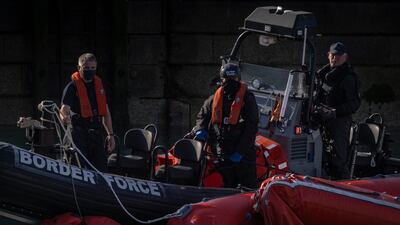The UK wants to “re-establish co-operation” after a series of diplomatic rows including a newly signed submarine and defence pact and migrants reaching English shores, President Emmanuel Macron's office said on Friday.
Prime Minister Boris Johnson “reaffirmed the importance” of the London-Paris relationship but also, once again, raised the issue of migrants who camp in northern France hoping to reach the UK by sailing across the English Channel, one of the busiest shipping lanes in the world, in unseaworthy vessels.
The two leaders spoke by telephone on Friday.
“On the subject of small boat crossings in the Channel, the prime minister reiterated the UK’s position that we need to break the business model of people smugglers who put lives at risk. They agreed to intensify co-operation on this matter and agreed to keep talking on other issues,” a British government representative said.
“The prime minister also looked forward to welcoming President Macron to Glasgow in November for Cop26, and they discussed the importance of increased international action ahead of the summit on climate finance and net-zero commitments.”
The environmental Cop26 summit is being held in Scotland and the UK has been looking for stricter emissions cuts and more ambitious goals from countries trying to battle climate change.
Mr Macron was left furious last week after Australia ditched a mega-deal to buy diesel submarines from France in favour of American nuclear-powered ones — secured during secret negotiations enabled by Britain.

In the conversation, which the Elysees Palace said came at Mr Johnson's request, the British prime minister said he hoped for co-operation “in line with our values and our common interests”, such as the battle against climate change, securing the Indo-Pacific region and the fight against terrorism.
The UK government representative said: “They reaffirmed the importance of the UK-France relationship and agreed to continue working closely together around the world on our shared agenda, through Nato and bilaterally.
“The leaders noted in particular the strategic significance of our long-standing co-operation in the Indo-Pacific and in Africa, including through the joint mission in Mali.”
French fury over what it sees as a “stab in the back” over the submarine contract and the Aukus pact signed between the UK, Australia and US led to Mr Macron recall*ing the French ambassadors to Washington and Canberra in an unprecedented diplomatic protest.
But the French envoy in London remained at her post, with France's Europe Minister Clement Beaune dismissing London as a mere “third wheel” in the deal and a “junior partner” to the US.
Using franglais, Johnson this week appealed to France to “donnez-moi un break”, calling for calm after tempers flared in France, while also telling Paris to “prenez un grip” (“get a grip”).
The submarine spat brought relations between Paris and London to their worst since Britain's 2016 vote to leave the EU.
Brexit has led to several disagreements between both nations, notably over fishing rights but also the still vexing issue of trade between mainland Britain and the province of Northern Ireland.
Migrant flows have also been a major irritant between Paris and London.
There remains, however, a willingness on both sides to continue close co-operation in defence matters, experts say.
The submarine deal “created a legitimate anger in France and clearly dealt a serious blow to trust and co-operation between France and the UK in a relationship already strained by years of post-Brexit disputes,” said Hans Kundnani and Alice Billon-Galland, analysts at the Chatham House policy institute.


